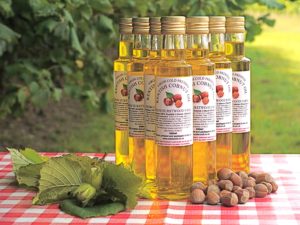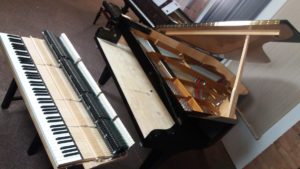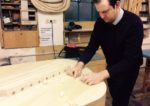Piano Maker’s Corner: Nuts, Pianos, & Voicing
 For a regular piano manufacturer, the words “harvest time” would not mean a great deal. Phoenix Pianos, based on Hurstwood Farm in Kent, however, is no regular piano manufacturer.
For a regular piano manufacturer, the words “harvest time” would not mean a great deal. Phoenix Pianos, based on Hurstwood Farm in Kent, however, is no regular piano manufacturer.
For the past 31 years, Hurstwood Farm has been a nut farm, with a yearly crop of Cobnuts (a nut similar to a Hazelnut, indigenous to Kent) and Walnuts. Harvest for this year is in full swing, with a swarm of pickers stripping every tree on our 44 acres. The nuts are then cracked, dried and packaged on site, with some being pressed for oil too. From here, the nuts are then sent all over the country to supermarkets and other retailers. All in all, it is a very busy time of year. In fact, some say you don’t have to be a nut to work here, but it helps!
It is not just the “nut” side of Hurstwood Farm that has been busy in recent times. We were very pleased to receive an order for a Phoenix C212 from North Carolina a little while back. The customer had not played one of our pianos before, but had heard good things about our technology and decided to take a leap of faith. It was my job as piano technician here to prepare the piano to his specifications. We talked over FaceTime to discuss the “voicing” of the hammers. (This is the process of needling the hammer felt in a particular way so as to soften it, thus creating a mellower tone) The customer was keen that the piano be very mellow, as he didn’t like a “bright” sound.
There is much debate about what is best when it comes to the tone of a piano, but it really comes down to personal preference. Often I’ll be at a customer’s house, servicing their piano, when I ask how they would like their hammers voiced. “You’re the expert, I trust your judgement” is often the reply. Of course, the varying sounds of a piano are to taste in the same way that some people like sugar in their coffee and some don’t! I always ask the customer to be involved in the voicing process. After all, they are the ones that will be playing the piano day in, day out – not me. Venue is also a big factor. If you have a grand piano in a small room, the hammers will likely need a little more voicing than say, a concert grand in a large hall, which will need to be brighter to compliment the acoustics properly.
As a side point, if you’re tired of your piano being a little harsh on your ears, speak to your piano tech. It’s not a difficult job to do voicing and any tuner worth their salt should be able to get the sound you’re after, providing the hammers aren’t too worn.
I did as our transatlantic customer asked, needling the hammers heavily to achieve a warm, mellow sound. I must say, this 212 was an absolute beauty. I was so sad to see it leave the showroom, but proud to know it would soon be in the USA. I thought that was the last I would see of that piano.
How wrong I was.
I was awoken at 5am on a Sunday morning by an email notification on my phone (So was my wife. She wasn’t very happy with me. I must remember to set my phone to silent at night!) It was a message from our customer. He was at Raleigh Airport with the piano, which had been taken out of its crate for inspection by the removal company that had the job of taking it from the airport to his house.
 It was bad news. Somewhere between London Gatwick and Raleigh International our wonderful little C212 took a blow so hard, the key bed distorted beyond repair and many other aspects of the piano were seriously damaged. The action was completely unplayable. How or why, we may never know. The situation is on-going as we speak. We have a new 212 currently on its way to Raleigh (this time via a ship. We won’t risk a plane again!).
It was bad news. Somewhere between London Gatwick and Raleigh International our wonderful little C212 took a blow so hard, the key bed distorted beyond repair and many other aspects of the piano were seriously damaged. The action was completely unplayable. How or why, we may never know. The situation is on-going as we speak. We have a new 212 currently on its way to Raleigh (this time via a ship. We won’t risk a plane again!).
The customer has been nothing short of wonderful, thank goodness. He has been so understanding and patient, despite the fact that the whole process from his order to now has taken months. We hope he will be very happy with his piano, when it (hopefully) arrives in the next few weeks. The damaged piano will be back with us soon too, so we can assess the damage and try and understand what an earth happened to this beautiful instrument. It might sound silly, but it was rather heart-breaking that it met such an untimely end.
Another exciting development here is our current documentary project that is in motion. With the help of our good friend James Bacon (www.pianorecording.co.uk), we are creating a documentary about Phoenix Pianos and our origins (mentioned in our first article on Piano Addict). We’ll keep you all posted on its progress.
In the last month we also finished our first ever Phoenix Upright 130cm piano, complete with a carbon-fiber soundboard and our patented bridge technology. The German company, Steingraeber and Sons helped us build this first model. In fact, they liked it so much they put their name on it as well as the Phoenix logo. Of course, we didn’t mind. If you built a car and Rolls Royce asked to put their name on it, you wouldn’t say no! We’re really proud of it too. Look out for performance videos on our website soon. We now have a fleet of 8 piano models. 5 Grand sizes, from 170cm to 272cm and 3 Upright models to order, from 122cm to 138cm high.
So it’s busy, busy, busy here during harvest in the Kent countryside at surely the world’s only nut farm/piano manufacturer!


